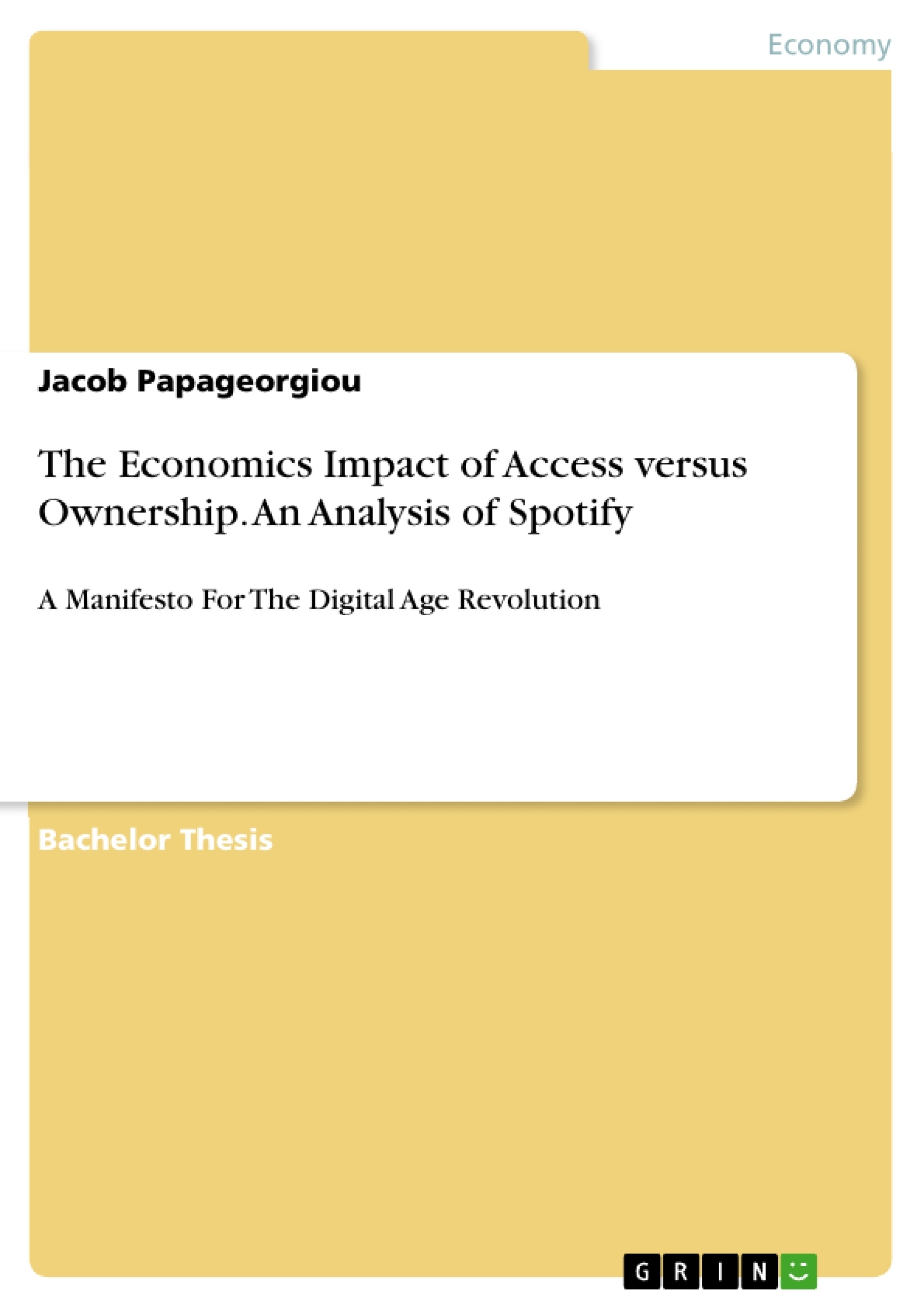The recording industry is undergoing an economic decline. The new generation needs a business model which supplements the demands of the digital age. This dissertation investigates the consumption of digital music. Rapid development in the digital music market has been led by the growth of online streaming services such as Spotify. Consumers now have the choice to obtain songs from a selection of paid and non-paid legal sources.
A perspective concerning digital natives is seen through the theory of access replacing ownership. Consumer group analysis of demands shows that ownership seems to be outdated. Spotify acts as an example to the theory of access. Access and ownership is further examined in this dissertation. These ideas are analysed alongside the economic impact of consumer behaviour in the music industry.
Table of Contents
- ACKNOWLEDGEMENTS
- ABSTRACT
- INTRODUCTION
- Method
- Importance of the Research Question
- Thesis Format
- CHAPTER 1: HOW IT WAS
- Ownership and Property Relevance
- Devices of the Recording Industry
- CHAPTER 2: IN PRESENT TIME
- The Recording Industry & Digitisation
- Internet and Music Distribution
- Networking Communities
- Consumerism: Habits and Trends
- Spotify: As A Business Model
- Economics and Finances
- International Market Competitors
- Spotify Users: Data Analysis
- CHAPTER 3: THE FUTURE OF ACCESS: EMPHASIS ON SPOTIFY
- When Access Takes Over Ownership
- Age of Access: Spotify
Objectives and Key Themes
This dissertation aims to examine the economic impact of the theory of access replacing ownership in the digital age, specifically focusing on the music industry and the rise of streaming services like Spotify. It explores the shift from traditional ownership models to subscription-based access models and analyzes how this shift affects consumer behavior and the economic landscape of the music industry.
- The impact of digitalization on the music industry
- The rise of streaming services and their impact on consumer behavior
- The economic implications of access versus ownership in the digital age
- The role of Spotify as a model for the music industry in the digital age
- The shift in consumer values and priorities in relation to music consumption
Chapter Summaries
- Introduction: This chapter introduces the research question, discusses the importance of the research, and outlines the structure of the dissertation. It also provides background information on the changing landscape of the music industry and the emergence of streaming services.
- Chapter 1: How it Was: This chapter explores the traditional ownership model of music consumption, discussing the relevance of ownership and property in the context of the recording industry. It examines the devices and practices used by the industry in the pre-digital age.
- Chapter 2: In Present Time: This chapter examines the current state of the music industry in the digital age. It analyzes the impact of digitization, the rise of the internet and music distribution, and the changing habits and trends of music consumers. The chapter focuses on Spotify as a significant player in the digital music market, analyzing its business model, economic performance, and international market competition.
- Chapter 3: The Future of Access: Emphasis on Spotify: This chapter explores the theory of access replacing ownership in the digital age, highlighting the role of Spotify as a prominent example of this shift. It discusses how access-based models are changing the way music is consumed and the implications for the music industry.
Keywords
The primary focus of this dissertation lies in the intersection of the music industry, digitalization, and the transition from ownership to access models. Key terms include music streaming, Spotify, digital natives, consumer behavior, economic impact, access vs. ownership, and the future of the music industry.
Frequently Asked Questions
What is the central theory discussed regarding digital music?
The dissertation focuses on the theory of "access replacing ownership," where consumers prefer streaming services over owning physical or digital copies.
How has Spotify impacted the music industry?
Spotify has led the growth of online streaming, providing a business model that meets the demands of the digital age and influences global market competition.
What are "Digital Natives" in the context of this study?
Digital natives are the generation that grew up with the internet, whose consumption habits have shifted from traditional property relevance to subscription-based models.
What economic impacts are analyzed in the dissertation?
The study analyzes how the shift to access models affects the recording industry's finances, consumer behavior, and the overall economic landscape.
Is ownership of music becoming outdated?
According to consumer group analysis in the text, traditional ownership seems to be losing relevance in favor of instant access via digital platforms.
- Citar trabajo
- Jacob Papageorgiou (Autor), 2016, The Economics Impact of Access versus Ownership. An Analysis of Spotify, Múnich, GRIN Verlag, https://www.grin.com/document/346463



